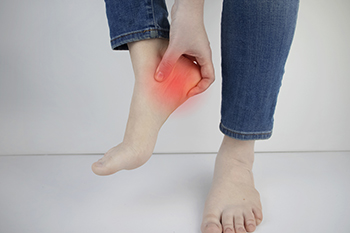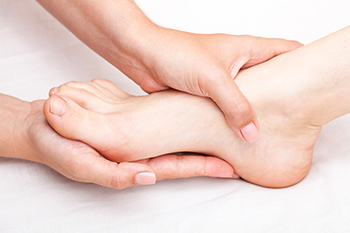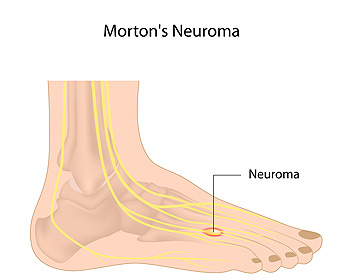Blog
Is My Heel Pain Plantar Fasciitis?

One of the most common foot problems is plantar fasciitis. It is an inflammation of the plantar fascia, which is the band of tissue that is found on the sole of the foot. It connects the heel to the toes, and it can become inflamed for various reasons. These include standing on hard or uneven surfaces for long periods of time or wearing shoes that have inadequate heel support. It can also happen from the aging process that may gradually wear down the heel pad. Some people endure an injury that can tear the plantar fascia, including a sudden fall, repetitive cycling, or frequent participation in running or jumping activities. Plantar fasciitis can be a common condition among people who are overweight, which may cause the fat pads to prematurely flatten as a result of the added weight the feet must carry. If you have pain in your heel or arch area, it is strongly suggested that you consult a podiatrist who can accurately diagnose the condition and offer the correct treatment options.
Plantar fasciitis is a common foot condition that is often caused by a strain injury. If you are experiencing heel pain or symptoms of plantar fasciitis, contact one of our podiatrists from Pennsylvania. Our doctors can provide the care you need to keep you pain-free and on your feet.
What Is Plantar Fasciitis?
Plantar fasciitis is one of the most common causes of heel pain. The plantar fascia is a ligament that connects your heel to the front of your foot. When this ligament becomes inflamed, plantar fasciitis is the result. If you have plantar fasciitis you will have a stabbing pain that usually occurs with your first steps in the morning. As the day progresses and you walk around more, this pain will start to disappear, but it will return after long periods of standing or sitting.
What Causes Plantar Fasciitis?
- Excessive running
- Having high arches in your feet
- Other foot issues such as flat feet
- Pregnancy (due to the sudden weight gain)
- Being on your feet very often
There are some risk factors that may make you more likely to develop plantar fasciitis compared to others. The condition most commonly affects adults between the ages of 40 and 60. It also tends to affect people who are obese because the extra pounds result in extra stress being placed on the plantar fascia.
Prevention
- Take good care of your feet – Wear shoes that have good arch support and heel cushioning.
- Maintain a healthy weight
- If you are a runner, alternate running with other sports that won’t cause heel pain
There are a variety of treatment options available for plantar fasciitis along with the pain that accompanies it. Additionally, physical therapy is a very important component in the treatment process. It is important that you meet with your podiatrist to determine which treatment option is best for you.
If you have any questions, please feel free to contact one of our offices located in Plymouth Meeting and Ambler, PA . We offer the newest diagnostic and treatment technologies for all your foot care needs.
Sports Podiatrists

Podiatrists are foot specialists that are specially trained in addressing different afflictions of the feet. They are trusted medical professionals who can treat a range of various foot conditions, from plantar fasciitis to hammertoe. It is important to note there are different types of podiatrists who may specialize in specific areas in the field of podiatry. For example, one such kind of podiatrist is known as a sports podiatrist. As the name suggests, this type of podiatrist works primarily with athletes and those who engage in sports. A sports podiatrist is well-versed in understanding, recognizing, and treating the nuances of foot injuries in the context of sports. Some of these sports podiatrists are engaged in producing research in their field. These podiatrists are easily able to identify the foot afflictions that most affect athletes. To learn more about the different types of podiatrists available to help you address any foot problems, it is suggested that you schedule an appointment with a podiatrist today.
If you are experiencing pain in the feet or ankles, don’t join the stubborn majority refusing treatment. Feel free to contact one of our podiatrists from Pennsylvania. Our doctors can provide the care you need to keep you pain-free and on your feet.
What Is a Podiatrist?
Someone would seek the care of a podiatrist if they have suffered a foot injury or have common foot ailments such as heal spurs, bunions, arch problems, deformities, ingrown toenails, corns, foot and ankle problems, etc.
Podiatric Treatment
A podiatrist will treat the problematic areas of the feet, ankle or lower leg by prescribing the following:
- Physical therapy
- Drugs
- Orthotic inserts or soles
- Surgery on lower extremity fractures
A common podiatric procedure a podiatrist will use is a scanner or force plate which will allow the podiatrist to know the designs of orthotics. Patients are then told to follow a series of tasks to complete the treatment. The computer will scan the foot a see which areas show weight distribution and pressure points. The podiatrist will read the analysis and then determine which treatment plans are available.
If you have any questions please feel free to contact one of our offices located in Plymouth Meeting and Ambler, PA . We offer the newest diagnostic and treatment technologies for all your foot and ankle needs.
Symptoms and Causes of Morton’s Neuroma

Pain in the ball of the foot, sometimes described as having a stone in the bottom of the shoe, is generally a symptom of Morton’s neuroma. This benign condition is the result of extra nerve tissue growing between the third and fourth toes of the foot. Simply putting weight on the foot when standing or walking can set off the nerve pain from Morton’s neuroma. Among the contributing factors leading to Morton’s neuroma are wearing high-heeled shoes with narrow toe boxes and playing sports for extended periods. Not surprisingly, cases of Morton’s neuroma are more likely to be found in women between 40 and 70 years old. On the other hand, most men with this condition are under 30 years old. Symptoms include pain in the ball of the foot, a burning and tingling pain in the nearby toes, and feeling like a sock is bunched up inside the shoe. Changes to footwear and massaging the affected area can help to alleviate the pain. In more severe cases, a surgical solution may be necessary. If you believe you have Morton’s neuroma, it is suggested that you consult a podiatrist for an exam and diagnosis before deciding on treatment options.
Morton’s neuroma is a very uncomfortable condition to live with. If you think you have Morton’s neuroma, contact one of our podiatrists of Pennsylvania. Our doctors will attend to all of your foot care needs and answer any of your related questions.
Morton’s Neuroma
Morton's neuroma is a painful foot condition that commonly affects the areas between the second and third or third and fourth toe, although other areas of the foot are also susceptible. Morton’s neuroma is caused by an inflamed nerve in the foot that is being squeezed and aggravated by surrounding bones.
What Increases the Chances of Having Morton’s Neuroma?
- Ill-fitting high heels or shoes that add pressure to the toe or foot
- Jogging, running or any sport that involves constant impact to the foot
- Flat feet, bunions, and any other foot deformities
Morton’s neuroma is a very treatable condition. Orthotics and shoe inserts can often be used to alleviate the pain on the forefront of the feet. In more severe cases, corticosteroids can also be prescribed. In order to figure out the best treatment for your neuroma, it’s recommended to seek the care of a podiatrist who can diagnose your condition and provide different treatment options.
If you have any questions, please feel free to contact one of our offices located in Plymouth Meeting and Ambler, PA . We offer the newest diagnostic and treatment technologies for all your foot care needs.

